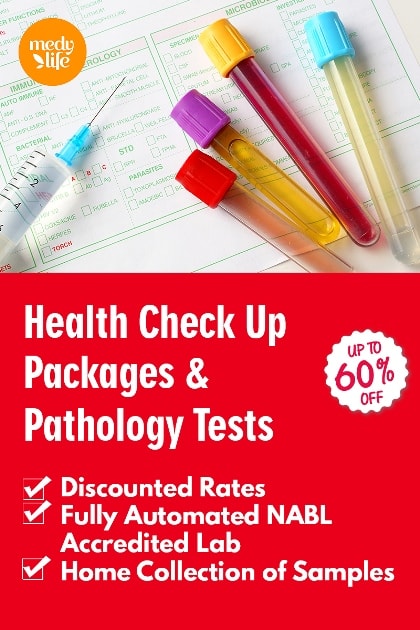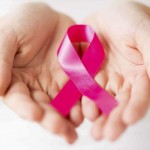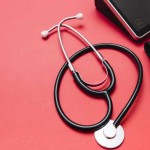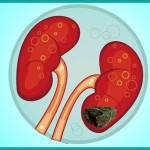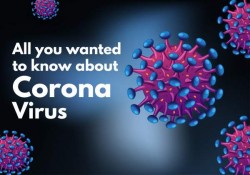
All You Wanted to Know about Corona Virus
15-03-2020 | Posted By: Vivek Singh | 13642 View(s)
Coronaviruses (CoV) are a large family of viruses that cause illness ranging from the common cold to more severe diseases such as Middle East Respiratory Syndrome (MERS-CoV) and Severe Acute Respiratory Syndrome (SARS-CoV). A novel coronavirus (nCoV) is a new strain that has not been previously identified in humans.
Coronaviruses are zoonotic, meaning they are transmitted between animals and people. Detailed investigations found that SARS-CoV was transmitted from civet cats to humans and MERS-CoV from dromedary camels to humans. Several known coronaviruses are circulating in animals that have not yet infected humans.
Common signs of infection include respiratory symptoms, fever, cough, shortness of breath and breathing difficulties. In more severe cases, the infection can cause pneumonia, severe acute respiratory syndrome, kidney failure and even death.
Standard recommendations to prevent infection spread include regular hand washing, covering mouth and nose when coughing and sneezing, thoroughly cooking meat and eggs. Avoid close contact with anyone showing symptoms of respiratory illness such as coughing and sneezing.
So here is all that you wanted to know about CORONA VIRUS-Courtesy WHO.but before that you can listen to what Prof Anupam Sibal-Group Medical Director & Senior Pediatrician-Apollo Hospitals Group has to say about Coronavirus.
What is Coronavirus?
Coronaviruses are a large family of viruses which may cause illness in animals or humans. In humans, several coronaviruses are known to cause respiratory infections ranging from the common cold to more severe diseases such as Middle East Respiratory Syndrome (MERS) and Severe Acute Respiratory Syndrome (SARS). The most recently discovered coronavirus causes coronavirus disease COVID-19.
What is COVID-19?
COVID-19 is an infectious disease caused by the most recently discovered coronavirus. This new virus and disease were unknown before the outbreak began in Wuhan, China, in December 2019.
What are the Symptoms of COVID-19?
COVID-19 is a respiratory condition caused by a coronavirus. Most people will have mild symptoms and get better on their own. But about 1 in 6 people will have more severe problems, such as trouble breathing. The risk of more serious symptoms is higher if you’re older or have another health condition like diabetes or high blood pressure. Here’s what to look for if you think you might have COVID-19.
Common Symptoms
Signs of COVID-19 usually begin 2-14 days after a person has been infected. One study of more than 55,000 cases of the illness in China showed the range of symptoms that can happen with COVID-19, and how common they are:
Fever: 88%
Dry cough: 68%
Fatigue: 38%
Coughing up thick phlegm from the lungs: 33%
Shortness of breath: 19%
Bone or joint pain: 15%
Sore throat: 14%
Headache: 14%
Chills: 11%
Nausea or vomiting: 5%
Stuffy nose: 5%
Diarrhoea: 4%
Coughing up blood: 1%
Swollen eyes: 1%
Some people get infected with the coronavirus but don’t have any symptoms. Most of those people get better without treatment.
The CDC has added several new symptoms to its list for the coronavirus: chills, muscle pain, headache, sore throat, repeated shaking with chills, and a loss of taste or smell.
The six new symptoms join the existing list: fever, coughing, and shortness of breath or difficulty breathing.
The expanded list could help those who are trying to identify whether they have symptoms related to COVID-19. With a limited number of test kits available, those who want to take a test typically must show symptoms first.
Several patients with COVID-19 began reporting a loss of taste or smell last month, as well as muscle pain, chills, and a headache, NPR reported.
The CDC website still says symptoms appear within 2 to 14 days of exposure to the virus. Importantly, the “emergency warning signs” for COVID-19 include trouble with breathing, persistent pain or pressure in the chest, bluish lips or face, and confusion or not being able to rouse. People with these symptoms should seek medical attention right away, the CDC says.
Serious Symptoms
Call a doctor or hospital right away if you have:
Problems breathing
Constant pain or pressure in your chest
Bluish lips or face
Sudden confusion
These symptoms mean you need medical treatment. Call your doctor or hospital before you go in for care. This will help them prepare to treat you and protect medical staff and other patients.
Is It COVID-19, the Flu, a Cold, or Hay Fever?
Since they share so many of the same symptoms, it can be hard to know which condition you have. But there are a few guidelines that can help. You may have COVID-19 if you have a fever and a hard time breathing, along with the symptoms listed above. If you don’t have problems breathing, it might be the flu.
It’s probably allergies if you don’t have a fever but your eyes are itchy, you’re sneezing, and you have a runny nose. If you don’t have a fever and your eyes aren’t itchy, it’s probably the common cold.
How does COVID-19 spread?
People can catch COVID-19 from others who have the virus. The disease can spread from person to person through small droplets from the nose or mouth which are spread when a person with COVID-19 coughs or exhales. These droplets land on objects and surfaces around the person. Other people then catch COVID-19 by touching these objects or surfaces, then touching their eyes, nose or mouth. People can also catch COVID-19 if they breathe in droplets from a person with COVID-19 who coughs out or exhales droplets. This is why it is important to stay more than 1 meter (3 feet) away from a person who is sick.
Mode of Transmission-Summarized
Person-to-Person Transmission
Experts believe the virus that causes COVID-19 spreads mainly from person to person. There are several ways that this can happen:
Droplets: When an infected person coughs or sneezes, droplets with the virus fly from their nose or mouth into the air. Anyone who is within 6 feet of that person can breathe those droplets into their lungs.
Airborne Transmission: Research shows that the virus can stay alive in the air for up to 3 hours. When you breathe air that has the virus floating in it, it gets into your lungs.
Fecal-Oral: Studies also suggest that virus particles can be found in infected people’s poop. But it still isn’t known if the infection can spread through contact with an infected person’s poop. If that person uses the bathroom and doesn’t wash their hands, they could infect things and people that they touch.
Surface Transmission: Another way to catch the new coronavirus is if you touch surfaces that someone with the virus has coughed or sneezed on. You may touch a countertop or doorknob that’s contaminated and then touch your nose, mouth, or eyes. The virus can live on surfaces like plastic and stainless steel for 2 to 3 days. To prevent the spread, clean and disinfect all counters, knobs, and other surfaces you and your family touch several times a day.
The virus most often spreads through people who have symptoms. But it may be possible to spread the virus and not show any signs. Some people who don’t know they’ve been infected can pass it to others.
Community Spread
Sometimes a person can trace how they got the virus because they will know they have been in contact with someone who is sick. In other cases, the cause is unknown. Community spread is when someone gets the virus without any known contact with a known sick person.
_____________________________________
Can the virus that causes COVID-19 be transmitted through the air?
Studies to date suggest that the virus that causes COVID-19 is mainly transmitted through contact with respiratory droplets rather than through the air.
________________________________________
Can CoVID-19 be caught from a person who has no symptoms?
The main way the disease spreads is through respiratory droplets expelled by someone who is coughing. The risk of catching COVID-19 from someone with no symptoms at all is very low. However, many people with COVID-19 experience only mild symptoms. This is particularly true in the early stages of the disease. It is, therefore, possible to catch COVID-19 from someone who has, for example, just a mild cough and does not feel ill. WHO is assessing ongoing research on the period of transmission of COVID-19 and will continue to share updated findings.
________________________________________
Can I catch COVID-19 from the faeces of someone with the disease?
The risk of catching COVID-19 from the feces of an infected person appears to be low. While initial investigations suggest the virus may be present in faeces in some cases, spread through this route is not a main feature of the outbreak. WHO is assessing ongoing research on the ways COVID-19 is spread and will continue to share new findings. Because this is a risk, however, it is another reason to clean hands regularly, after using the bathroom and before eating.
________________________________________
Can I take Antibiotics to cure Covid 19
As of now, there are no studies to suggest that any antibiotic is effective against coronavirus. Moreover, Antibiotics are known to work against bacterial infections whereas coronavirus is a Virus. So stay away from Antibiotics
________________________________________
Can Mosquito Bite Spread Coronavirus
As per WHO, there are no studies to suggest that it can spread through Mosquito bites contrary to what some Chinese reports suggest. So it is best to avoid Mosquitoes in any case
_______________________________________
Can Hand Dryers kill Coronavirus
No-It doesn’t kill Coronavirus.Only handwash can
________________________________________
Can Thermometers detect Coronavirus
No, they don’t. Thermometers can detect fever which is found to be prevalent in the majority of the patients suffering from Coronavirus.So it can be a means to find those suffering from fever but not a test for Coronavirus. Thermal scanners at the Airport too can detect the temperature of a person but nothing beyond that.
________________________________________
Are only Elderly at Risk
Coronavirus attacks those with weak Immunity. When the virus attacks the body then WBC in the body becomes active. Since immunity of the elderly is generally weak it tends to affect them more but in no way means that the young cannot get affected
________________________________________
Mask protects against Coronavirus
Wearing Masks properly can help but does not guarantee complete immunity against the virus. At best it acts as a hindrance for spreading the virus.
________________________________________
Are People with A+ Blood Group more likely to get affected by Coronavirus as compared to others.
As per a research published in Science Focus Magazine-Chinese Researchers studied 2000 patients of coronavirus virus.85 (41 per cent) out of a total of206 who died had blood group A+. Whereas those with O+ blood group was Twenty Five per cent. They found that those with A+ Group were more likely to have severe infections as compared to those with O+ Blood group.
However, this study by Chinese has not been endorsed WHO or by any other country and also the report is yet to be published in any of the journals. So as of now, it is only a view and not an established Fact
________________________________________
Is there a Vaccine against Coronavirus
No there is no Vaccine available against Coronavirus as of today. Scientist for around the world are still working on it.
________________________________________
Can UV Lamp kill Coronavirus
No-There is no evidence to suggest that.
________________________________________
Can Pets spread Coronavirus
No evidence to suggest that coronavirus can spread from Dogs, Cats or any other pets. The best thing to do is to wash your hands properly after touching them and follow good hygiene regime for your pet too.
________________________________________
Ok, You Shouldn’t Fly—But What About a Road Trip?
So here we are, advised to keep our distance from others for fear of spreading the deadly coronavirus. And yet we’re missing out on our travel plans, and even more fearful that we may have to skip our summer vacations. So what about hitting the road? That’s got to be okay, right? After all, we’re in our own bubbled space within the confines of our cars, free from others’ germs…
Actually, no.
While you may think that travelling to more rural destinations within our own confines ensures that you can keep r proper, mandated social distance, there are other things to think about. First off, what if you get sick while on the road, from coronavirus or something else? It’s not fair to tax already-burdened medical facilities in more rural areas.
What can I do to protect myself and prevent the spread of disease?
Protection measures for everyone
Stay aware of the latest information on the COVID-19 outbreak, available on the WHO website and through your national and local public health authority. Many countries around the world have seen cases of COVID-19 and several have seen outbreaks. Authorities in China and some other countries have succeeded in slowing or stopping their outbreaks. However, the situation is unpredictable so check regularly for the latest news.
You can reduce your chances of being infected or spreading COVID-19 by taking some simple precautions:
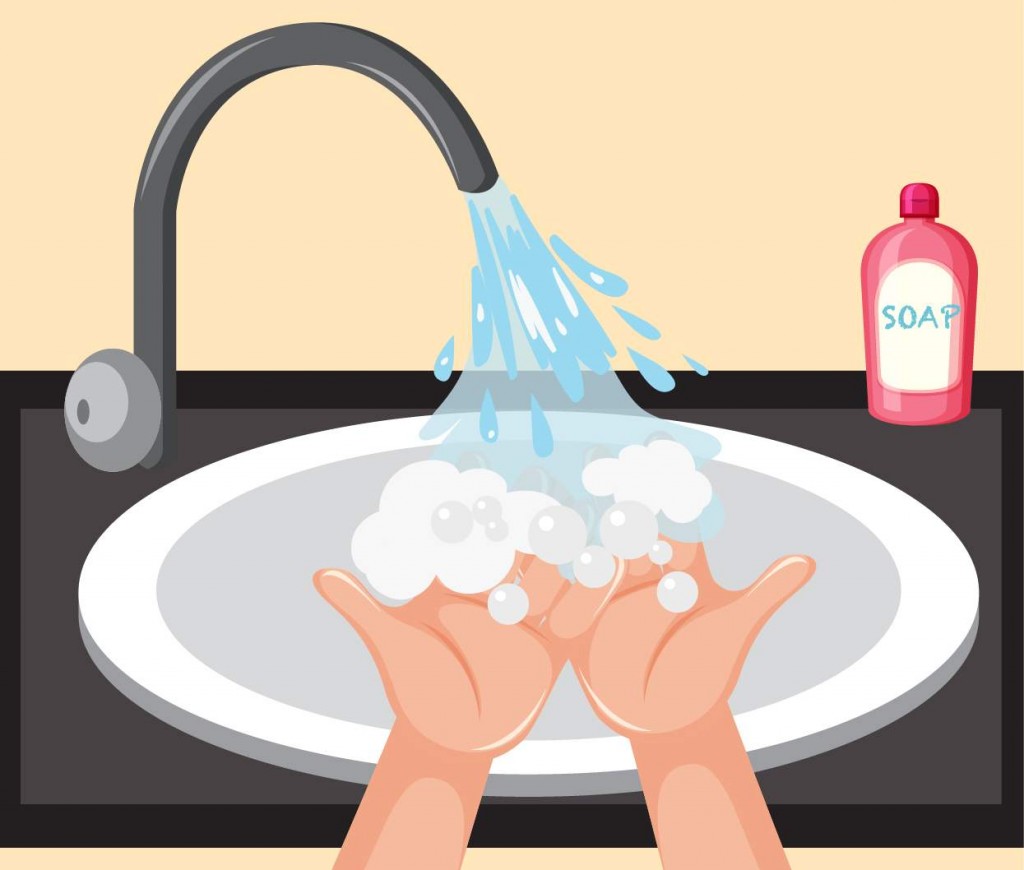
Wash your hands Frequently
Regularly and thoroughly clean your hands with an alcohol-based hand rub or wash them with soap and water.
Why? Washing your hands with soap and water or using alcohol-based hand rub kills viruses that may be on your hands.
Keep a bottle of sanitizer available at each of your home’s entrances and in your car for use after getting gas or touching other contaminated objects when you can’t immediately wash your hands.
Maintain Social Distancing
Maintain at least 1 metre (3 feet) distance between yourself and anyone who is coughing or sneezing.
Why? When someone coughs or sneezes they spray small liquid droplets from their nose or mouth which may contain the virus. If you are too close, you can breathe in the droplets, including the COVID-19 virus if the person coughing has the disease.
Avoid touching Eyes, Nose and Mouth
Why? Hands touch many surfaces and can pick up viruses. Once contaminated, hands can transfer the virus to your eyes, nose or mouth. From there, the virus can enter your body and can make you sick.
If possible, cough or sneeze into a disposable tissue and discard. Use your elbow only if you have to. The clothing on your elbow will contain an infectious virus that can be passed on for up to a week or more!
Practice Respiratory Hygiene
Make sure you, and the people around you, follow good respiratory hygiene. This means covering your mouth and nose with your bent elbow or tissue when you cough or sneeze. Then dispose of the used tissue immediately.
Why? Droplets spread the virus. By following good respiratory hygiene you protect the people around you from viruses such as cold, flu and COVID-19.
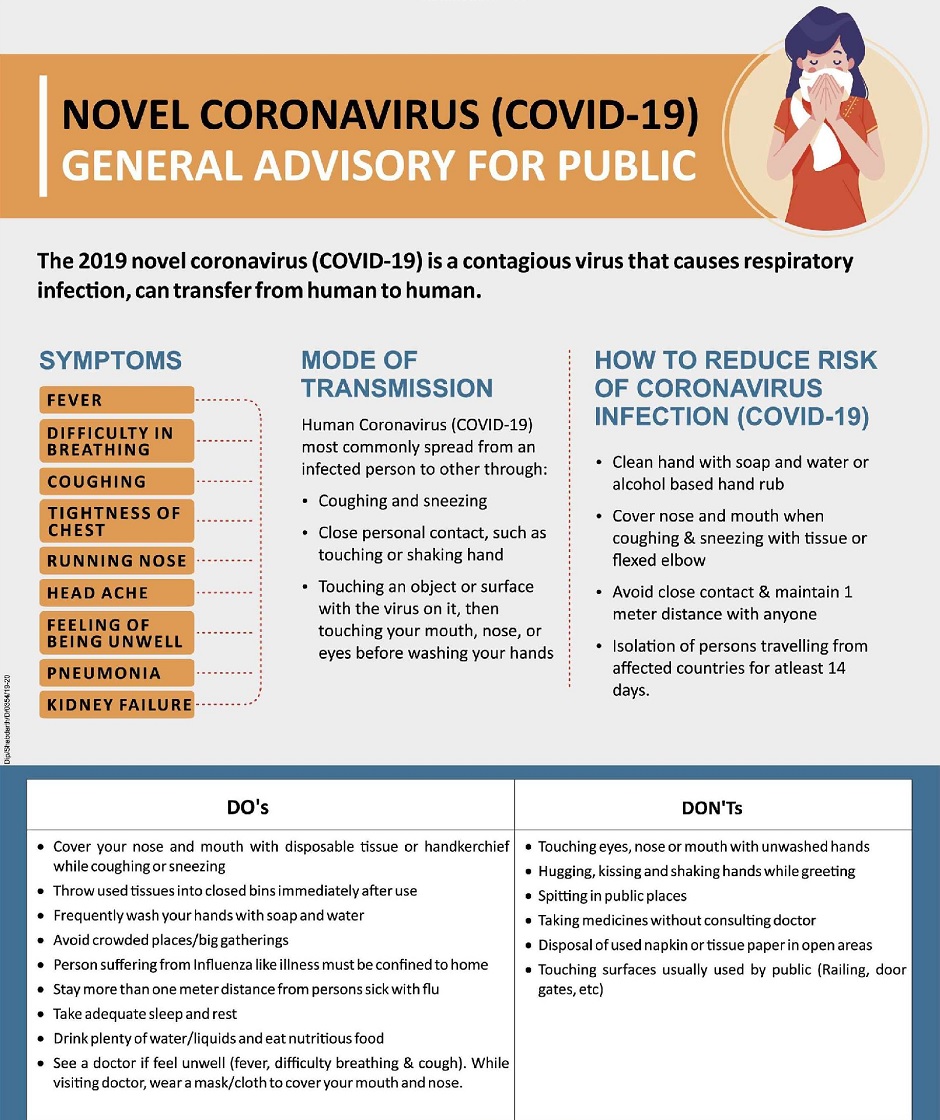
Stay informed and follow the advice given by your healthcare provider
Stay informed on the latest developments about COVID-19. Follow the advice given by your healthcare provider, your national and local public health authority or your employer on how to protect yourself and others from COVID-19.
Why? National and local authorities will have the most up to date information on whether COVID-19 is spreading in your area. They are best placed to advise on what people in your area should be doing to protect themselves.
Avoid Direct Contact with Objects
Use your knuckle to touch light switches. elevator buttons, etc. Use disposable gloves. Open doors with your closed fist or hip – do not grasp the handle with your hand, unless there is no other way to open the door. Especially important on bathroom and post office/commercial doors. Use disinfectant wipes at the stores when they are available, including wiping the handle and child seat in grocery carts.
Additional Measures:
-Sanitise your Mobile phone too as it could be infected. You can use a regular sanitizer to keep your mobile clean and free from virus
If you have fever, cough and difficulty breathing, seek medical care early
Stay home if you feel unwell. If you have a fever, cough and difficulty breathing, seek medical attention and call in advance. Follow the directions of your local health authority.
Why? National and local authorities will have the most up to date information on the situation in your area. Calling in advance will allow your health care provider to quickly direct you to the right health facility. This will also protect you and help prevent the spread of viruses and other infections.
Protection measures for persons who are in or have recently visited (past 14 days) areas where COVID-19 is spreading
• Follow the guidance outlined above.
• Stay at home if you begin to feel unwell, even with mild symptoms such as headache and slight runny nose, until you recover. Why? Avoiding contact with others and visits to medical facilities will allow these facilities to operate more effectively and help protect you and others from possible COVID-19 and other viruses.
• If you develop fever, cough and difficulty breathing, seek medical advice promptly as this may be due to a respiratory infection or other serious condition. If you suspect Covi-19 the best thing is to seek medical help as early as possible and isolate or quarantine yourself till you receive medical help
Quarantine and Isolation
What does it mean to be quarantined? People who have been exposed to an infectious disease and may be infected but are not yet ill may be quarantined. That is, they may be asked to remain at home or another location to prevent further spread of illness to others and to carefully monitor for the disease.
During quarantine, people are able to do most things they can do indoors within the constraints of the location they are at. For example, if people are asked to stay at home then they would usually be asked to take their own temperature and report daily to health authorities on how they are feeling. They are given instructions on what they can do and not do around family members and are informed of other disease precautions.
If they are asked to stay in a place away from home they are provided with meals, sleeping accommodations, and other necessities. They would stay there until the risk of developing the disease or spreading the disease is over.
Another measure of disease control is called isolation. This is for individuals who are sick from the contagious disease. These individuals are kept separate from others — or “isolated” — usually within a health care facility or at home. Typically, the ill person will have his or her own room, and caretakers will take certain precautions such as wearing protective clothing.
Quarantine and isolation are usually undertaken voluntarily but in rare circumstances can be required by public health authorities.
These measures are implemented to contain and prevent the transmission of an infectious disease. It will last enough time for medical personnel to assess the situation or for the duration of the contagious period.
Call in advance and tell your provider of any recent travel or contact with travellers. Why? Calling in advance will allow your health care provider to quickly direct you to the right health facility. This will also help to prevent the possible spread of COVID-19 and other viruses.
How likely am I to catch COVID-19?
The risk depends on where you are – and more specifically, whether there is a COVID-19 outbreak unfolding there.
For most people in most locations, the risk of catching COVID-19 is still low. However, there are now places around the world (cities or areas) where the disease is spreading. For people living in, or visiting, these areas the risk of catching COVID-19 is higher. Governments and health authorities are taking vigorous action every time a new case of COVID-19 is identified. Be sure to comply with any local restrictions on travel, movement or large gatherings. Cooperating with disease control efforts will reduce your risk of catching or spreading COVID-19.
COVID-19 outbreaks can be contained and transmission stopped, as has been shown in China and some other countries. Unfortunately, new outbreaks can emerge rapidly. It’s important to be aware of the situation where you are or intend to go. WHO publishes daily updates on the COVID-19 situation worldwide. You can see these Here.
Should I worry about COVID-19?
Illness due to COVID-19 infection is generally mild, especially for children and young adults. However, it can cause serious illness: about 1 in every 5 people who catch it need hospital care. It is therefore quite normal for people to worry about how the COVID-19 outbreak will affect them and their loved ones.
We can channel our concerns into actions to protect ourselves, our loved ones and our communities. First and foremost among these actions is regular and thorough hand-washing and good respiratory hygiene. Secondly, keep informed and follow the advice of the local health authorities including any restrictions put in place on travel, movement and gatherings. Learn more about how to protect yourself at https://www.who.int/emergencies/diseases/novel-coronavirus-2019/advice-for-public
Who is at risk of developing severe illness?
While we are still learning about how COVID-2019 affects people, older persons and persons with pre-existing medical conditions (such as high blood pressure, heart disease, lung disease, cancer or diabetes) appear to develop serious illness more often than others.
Status on 15.03.20

To View current status of Confirmed Coronavirus cases worldwide-Click Here
To View Statewise Confirmed Coronavirus cases in India-Click Here
Are antibiotics effective in preventing or treating the COVID-19?
No. Antibiotics do not work against viruses, they only work on bacterial infections. COVID-19 is caused by a virus, so antibiotics do not work. Antibiotics should not be used as a means of prevention or treatment of COVID-19. They should only be used as directed by a physician to treat a bacterial infection.
Is there a vaccine, drug or treatment for COVID-19?
Not yet. To date, there is no vaccine and no specific antiviral medicine to prevent or treat COVID-2019. However, those affected should receive care to relieve symptoms. People with serious illness should be hospitalized. Most patients recover thanks to supportive care.
Possible vaccines and some specific drug treatments are under investigation. They are being tested through clinical trials. WHO is coordinating efforts to develop vaccines and medicines to prevent and treat COVID-19.
The most effective ways to protect yourself and others against COVID-19 are to frequently clean your hands, cover your cough with the bend of elbow or tissue, and maintain a distance of at least 1 meter (3 feet) from people who are coughing or sneezing. (See Basic protective measures against the new coronavirus).

Should I wear a mask to protect myself?
Only wear a mask if you are ill with COVID-19 symptoms (especially coughing) or looking after someone who may have COVID-19. A disposable face mask can only be used once. If you are not ill or looking after someone who is ill then you are wasting a mask. There is a world-wide shortage of masks, so WHO urges people to use masks wisely.
WHO advises rational use of medical masks to avoid unnecessary wastage of precious resources and mis-use of masks (see Advice on the use of masks).
The most effective ways to protect yourself and others against COVID-19 are to frequently clean your hands, cover your cough with the bend of elbow or tissue and maintain a distance of at least 1 meter (3 feet) from people who are coughing or sneezing. See basic protective measures against the new coronavirus for more information.
How to put on, use, take off and dispose of a mask?
1. Remember, a mask should only be used by health workers, caretakers, and individuals with respiratory symptoms, such as fever and cough.
2. Before touching the mask, clean hands with an alcohol-based hand rub or soap and water
3. Take the mask and inspect it for tears or holes.
4. Orient which side is the top side (where the metal strip is).
5. Ensure the proper side of the mask faces outwards (the coloured side).
6. Place the mask to your face. Pinch the metal strip or stiff edge of the mask so it moulds to the shape of your nose.
7. Pull down the mask’s bottom so it covers your mouth and your chin.
8. After use, take off the mask; remove the elastic loops from behind the ears while keeping the mask away from your face and clothes, to avoid touching potentially contaminated surfaces of the mask.
9. Discard the mask in a closed bin immediately after use.
10. Perform hand hygiene after touching or discarding the mask – Use alcohol-based hand rub or, if visibly soiled, wash your hands with soap and water.
How long is the incubation period for COVID-19?
The “incubation period” means the time between catching the virus and beginning to have symptoms of the disease. Most estimates of the incubation period for COVID-19 range from 1-14 days, most commonly around five days. These estimates will be updated as more data become available.
Can humans become infected with the COVID-19 from an animal source?
Coronaviruses are a large family of viruses that are common in animals. Occasionally, people get infected with these viruses which may then spread to other people. For example, SARS-CoV was associated with civet cats and MERS-CoV is transmitted by dromedary camels. Possible animal sources of COVID-19 have not yet been confirmed.
To protect yourself, such as when visiting live animal markets, avoid direct contact with animals and surfaces in contact with animals. Ensure good food safety practices at all times. Handle raw meat, milk or animal organs with care to avoid contamination of uncooked foods and avoid consuming raw or undercooked animal products.
Can I catch COVID-19 from my pet?
No. There is no evidence that companion animals or pets such as cats and dogs have been infected or could spread the virus that causes COVID-19.

How long does the virus survive on surfaces?
It is not certain how long the virus that causes COVID-19 survives on surfaces, but it seems to behave like other coronaviruses. Studies suggest that coronaviruses (including preliminary information on the COVID-19 virus) may persist on surfaces for a few hours or up to several days. This may vary under different conditions (e.g. type of surface, temperature or humidity of the environment).
Here’s a guide to how long coronaviruses — the family of viruses that includes the one that causes COVID-19 — can live on some of the surfaces you probably touch on a daily basis. Keep in mind that researchers still have a lot to learn about the new coronavirus that causes COVID-19. For example, they don’t know whether exposure to heat, cold, or sunlight affects how long it lives on surfaces.
Metal
Examples: doorknobs, jewellery, silverware
5 days
Wood
Examples: furniture, decking
4 days
Plastics
Examples: packaging like milk containers and detergent bottles, subway and bus seats, backpacks, elevator buttons
2 to 3 days
Stainless steel
Examples: refrigerators, pots and pans, sinks, some water bottles
2 to 3 days
Cardboard
Examples: shipping boxes
24 hours
Copper
Examples: pennies, teakettles, cookware
4 hours
Aluminum
Examples: soda cans, tinfoil, water bottles
2 to 8 hours
Glass
Examples: drinking glasses, measuring cups, mirrors, windows
Up to 5 days
Ceramics
Examples: dishes, pottery, mugs
5 days
Paper
The length of time varies. Some strains of coronavirus live for only a few minutes on paper, while others live for up to 5 days.
Food
Coronavirus doesn’t seem to spread through exposure to food. Still, it’s a good idea to wash fruits and vegetables under running water before you eat them. Scrub them with a brush or your hands to remove any germs that might be on their surface. Wash your hands after you visit the supermarket. If you have a weakened immune system, you might want to buy frozen or canned produce.
Water
Coronavirus hasn’t been found in drinking water. If it does get into the water supply, your local water treatment plant filters and disinfects the water, which should kill any germs.
Coronaviruses can live on a variety of other surfaces, like fabrics and countertops.
What You Can Do
To reduce your chance of catching or spreading coronavirus, clean and disinfect all surfaces and objects in your home and office every day. This includes:
Countertops
Tables
Doorknobs
Bathroom fixtures
Phones
Keyboards
Remote controls
Toilets
Use a household cleaning spray or wipe. If the surfaces are dirty, clean them first with soap and water and then disinfect them.
Keep surfaces clean, even if everyone in your house is healthy. People who are infected may not show symptoms, but they can still shed the virus onto surfaces.
After you visit the drugstore or supermarket, or bring in takeout food or packages, wash your hands for at least 20 seconds with soap and warm water. Do the same thing after you pick up a delivered newspaper.
Source:WebMd
Is it safe to receive a package from any area where COVID-19 has been reported?
Yes. The likelihood of an infected person contaminating commercial goods is low and the risk of catching the virus that causes COVID-19 from a package that has been moved, travelled, and exposed to different conditions and temperature is also low.
Is there anything I should not do?
The following measures ARE NOT effective against COVID-2019 and can be harmful:
• Smoking
• Taking traditional herbal remedies
• Wearing multiple masks
• Taking self-medication such as antibiotics
In any case, if you have fever, cough and difficulty breathing seek medical care early to reduce the risk of developing a more severe infection and be sure to share your recent travel history with your health care provider.
Self Assessment for Coronavirus
Protect Yourselves and Others
When to Get Tested for COVID-19
-You are not required to get tested for COVID-19 if you do not have any symptoms (Cough, Fever or Difficulty in breathing)
-If you have any of the above symptoms and have travelled to any of the COVID-19 affected countries including Italy, Republic of Korea, France, Spain, Germany, UAE etc or you are a contact of a Laboratory confirmed positive case immediately call the state Helpline Number or Ministry of Health and Family Welfare, Govt Of India. 24/7 helpline No 011-23978046
Listen to What Baba Ramdev has to say on Testing for Corona Virus
Homoeopathic Treatment
For prevention of Corona Virus- Take Arsenic album 30 2-3 pills in a day and influenzinum 200, 4 pills a day for three days-This will increase your immunity against cold and cough. However it is not a cure for Coronavirus but can surely be used to strengthen your immunity system- as per Dr Neena Singla from Singla Homeo Clinic-H-19/134, Sector-7, Rohini, Delhi
How can you find out if you have Coronavirus? You will have to take one of these 5 Tests
With the spread of coronavirus showing no sign of abating, all of India — much like everywhere in the world — is currently preoccupied with the unavoidable question: How do find out if I and my family have been infected?
Here we try to collate the relevant info on how it is being tested and found out if one has caught the dreaded virus that has already killed in thousands. This strain of the coronavirus COVID-19 – does not have a readily available test kit. But it can nevertheless be detected by a series of tests in the hospital.
Tests for the virus can only be conducted in specialised labs that are certified to do so. The lab will acquire one of the following samples from you:
-A swab test: The lab will take a special cotton swab and sample the inside of the throat or nose
-A nasal aspirate: The lab will inject a saline solution into your nose, then remove the sample with gentle suction.
-A tracheal aspirate: A thin, lighted tube called a bronchoscope goes into your lungs, where a sample will be collected.
-A sputum test: Sputum is a variation of mucus from your lungs that can be coughed out or sampled from the nose with a swab
-A blood test
The collected sample will be analysed for the virus, either through a blanket test for all variants of the coronavirus (including regular flu) or through a specialised gene sequencing test that locates the marker for the novel coronavirus.
However, you may only need testing if you have symptoms of infection and have recently travelled to parts of the world where infection rates are high. You may also need testing if you have had close contact with someone who has travelled to one of those areas. The symptoms of COVID-19 include:
Fever
Cough
Shortness of breath
Sore throat
As of now, there is no cure for COVID-19 infection.
The List of Covid Testing Centres across India is available at :
Ministry of Health and Family Welfare
Guidelines for domestic travel (air/train/inter-state bus travel)
1) Dos and Don’ts shall be provided along with tickets to the travellers by the agencies
concerned.
2) All passengers shall be advised to download Arogya Setu app on their mobile devices.
3) Suitable announcement about COVID-19 including precautionary measures to be followed
shall be made at airports/railway station/bus terminals and in flights/trains/bus.
4) The States/UTs shall ensure that all passengers shall undergo thermal screening at the point
of departure and only asymptomatic passengers are allowed to board the flight/train/bus.
5) During boarding and travel, all passengers shall use face covers/mask. They will also follow
hand hygiene, respiratory hygiene and maintain environmental hygiene.
6) At airports/railway stations/ bus terminals required measures to ensure social distancing shall
be taken.
7) Airports/railway stations/bus terminals should be regularly sanitized/disinfected and
availability of soaps and sanitizers shall be ensured.
8) Thermal screening at exit point shall be arranged.
9) Asymptomatic passengers will be permitted to go with the advice that they shall self-monitor
their health for 14 days. In case, they develop any symptoms, they shall inform the district
surveillance officer or the state/national call center (1075).
10) Those found symptomatic will be isolated and taken to the nearest health facility. They will
be assessed for clinical severity at the health facility.
11) Those having moderate or severe symptoms will be admitted to dedicated COVID Health
facilities and managed accordingly.
12) Those having mild symptoms will be given the option of home isolation or isolated in the Covid
Care Centre (both public & private facilities) as appropriate and tested as per ICMR protocol
available at https://www.mohfw.gov.in/pdf/Revisedtestingguidelines.pdf.
If positive, they will continue in COVID Care Centre and will be managed as per clinical
protocol.
If negative, the passenger may be allowed to go home, isolate himself/herself and selfmonitor his/her health for further 7 days. In case, any symptoms develop they shall inform
the district surveillance officer or the state/national call center (1075).
NOTE: States can also develop their own protocol with regards to quarantine and isolation
as per their assessment.
CORONA HELP LINE:
011-23978046
Toll Free : 1075
Email ID : ncov2019@gov.in
So take care to protect yourself and others from getting sick. Stay Healthy, Stay Protected and most importantly do not panic because there is no reason at all to panic.
https://www.worldometers.info/coronavirus/country/india/



